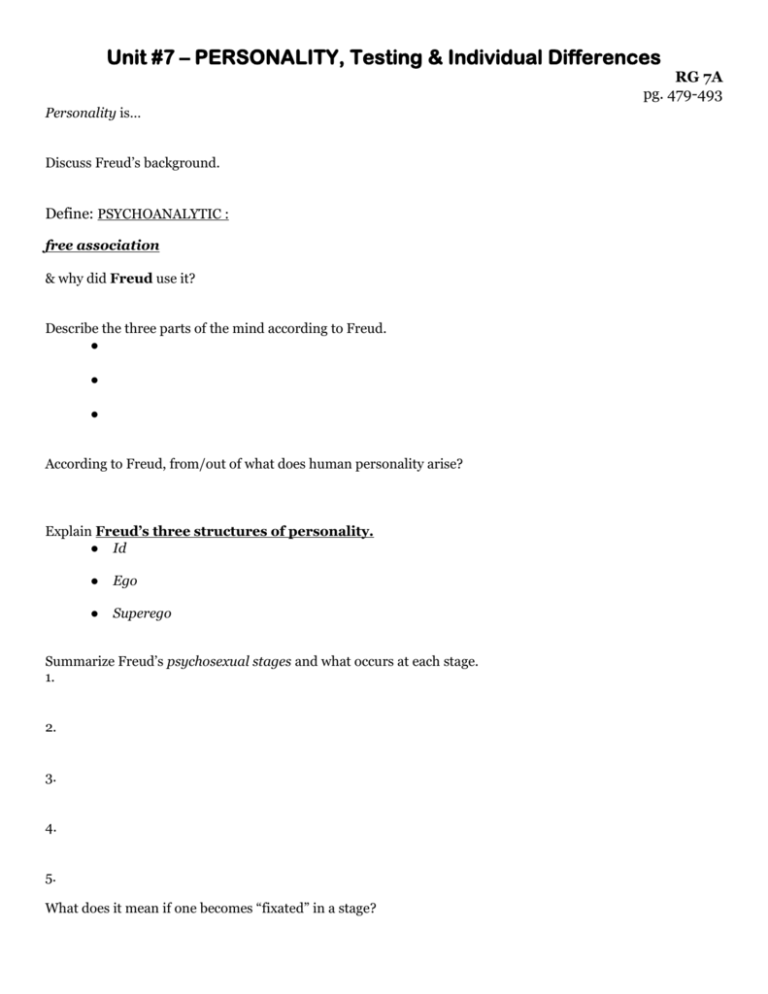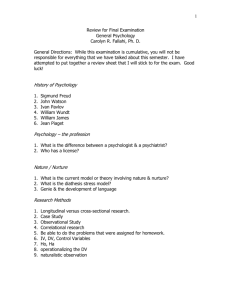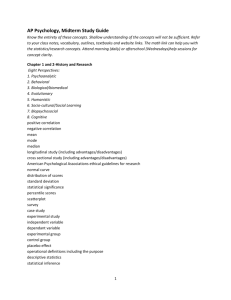How did the ancient Greek's categorize people's traits?
advertisement

Unit #7 – PERSONALITY, Testing & Individual Differences RG 7A pg. 479-493 Personality is… Discuss Freud’s background. Define: PSYCHOANALYTIC : free association & why did Freud use it? Describe the three parts of the mind according to Freud. ● ● ● According to Freud, from/out of what does human personality arise? Explain Freud’s three structures of personality. ● Id ● Ego ● Superego Summarize Freud’s psychosexual stages and what occurs at each stage. 1. 2. 3. 4. 5. What does it mean if one becomes “fixated” in a stage? What is a defense mechanism? Definition Example Repression Regression Reaction formation Projection Rationalization Displacement Denial Sublimation How do “neo-Freudians” mainly differ from Freud? Summarize the theories of each of the following neo-Freudians… ● Adler● Horney- ● Jung- What are projective tests? Describe the following types of projective tests… ● Thematic Apperception Test ● Rorschach Inkblot test Explain at least two findings in recent research that contradict Freud’s specific ideas. What was Freud right about? Why do we think so? II. HUMANISTIC Upon what does humanistic psychologists focus? Explain Maslow’s idea of self-actualization. List the characteristics Maslow associated with those people who fulfilled their potential. Explain the three conditions required for “growth”, according to Rogers. ● ● ● What is unconditional positive regard and how does it fit into this theory? What is self-concept? What does recent research say about the idea of a “self”? What are the 3 main criticisms of humanistic psychology? I. TRAIT PERSPECTIVE: A trait is… Explain Allport’s trait theory. RG 7B (493-518) How did the ancient Greek’s categorize people’s traits? Explain the Myers-Briggs Type Indicator. Why has it been criticized? When is it often used? How has factor analysis been used in identifying traits? Discuss the Eysencks’ view of traits (how many…what are they). How much of our personality is due to genetics? (include ideas about temperament) What are personality inventories? Describe the MMPI. What does it mean to say that it was “empirically derived”? Are personality inventories completely objective? Explain List and briefly describe the Big Five personality traits. ● ● ● ● ● How stable are these traits? How heritable are these traits? Explain the person-situation controversy as it relates to the trait theory. What does research seem to show about the consistency of expressive style? IV. SOCIAL-COGNITIVE Social-cognitive theorists focus on… Explain Bandura’s idea of reciprocal determinism. Describe 3 different ways in which the environment and personality interact. ■ ■ ■ Personal control is: External locus of control vs. internal locus of control (Rotter) Explain Seligman’s idea of learned helplessness. How does optimism impact a person’s personality and behaviors in a positive way? Excessive optimism can lead to… [CLOSE-UP box] Explain the idea of positive psychology. How does it differ from “normal” psychology? Describe the three “pillars” of positive psychology. 1st = 2nd = 3rd = How do social-cognitive theorists assess people’s behaviors and beliefs? Describe the main criticism of the social-cognitive perspective. What does recent research say about the idea of a “self”? Explain the spotlight effect. What is self-esteem? What are some benefits of high/positive self-esteem?Explain some of the forms of low self-esteem. Self-serving bias is… Explain the two main findings about self-serving bias. (look in bold on pg. 636) ● ● What has research shown concerning individuals with unrealistically high levels of selfesteem? INTELLIGENCE and TESTING Define intelligence: Is intelligence one general ability, or several specific abilities? What do you think? Explain Spearman’s idea of general intelligence (g). Define factor analysis. How did Thurstone’s theory challenge the idea of a “g factor”? Describe Gardner’s theory of multiple intelligences. List his eight multiple intelligences and describe the basic idea of each. 1. 2. 3. 4. 5. 6. 7. 8. How does savant syndrome play into his theory? Explain Sternberg’s triarchic theory of intelligence… a. analytical intelligence b. creative intelligence c. practical intelligence RG 7C pg. 523-531 Explain emotional intelligence. Is intelligence neurologically measurable? What do modern studies show about brain size and intelligence? Does Einstein’s brain fit these studies? Explain. Explain how intelligence is linked to… perceptual speed: neurological speed: RG 7D pg. 532-541 Intelligence tests are… Origins of Intelligence Testing Why was Binet commissioned by the French government to study the problem of the French education system? What did he and his collaborator, Simon, develop to fix this problem? Describe the idea of mental age. What did Binet hope the test would show? What did he fear it would do? What did Terman do to Binet’s test? What was it called? Describe the original formula for computing IQ. How is IQ computed today? What is the average IQ today? 2/3 of all people score… Aptitude tests vs. achievement tests Describe the WAIS. Principles of Test Construction Define standardization. Explain the normal curve. What does this show? To keep the average IQ around 100, what is done? Explain. Describe the Flynn effect. Define reliability. Explain the following ideas and how they relate to reliability… Test-retest- Split-half- Define validity. Explain the following ideas and how they relate to validity… Content validityCriterionPredictive validity- Are general aptitude tests as predictable as they are reliable? Do intelligence scores stay stable throughout the lifespan? Explain. RG 7E pg. 541-556 Extremes of Intelligence Define intellectual disability: Define mental retardation: Briefly explain the 4 degrees of mental retardation…. a. Mild b. Moderate c. Severe d. Profound Describe down syndrome. Describe the pendulum of opinion about caring for individuals with mental retardation Explain Terman’s research on intellectually gifted children. Discuss the criticisms of programs that sort children into gifted and non-gifted tracks. Genetic and Environmental Influences on Intelligence How have researchers used twins and adopted children to distinguish between the effects of genetics and environment on intelligence? What have they found? Explain the concept of heritability. How much impact does early environment have on a child’s intellect? What (if anything) can be done early in life (prior kindergarten) to improve intelligence? How are schooling and intelligence linked? Are there ethnic differences in intelligence? What is the cause of these differences? Is there a gap in IQ between the genders? How do boys and girls compare in the following areas? Spelling… Verbal ability… Nonverbal memory… Sensation… Underachievement… Math & Spatial aptitudes… How about gender differences in emotion-detecting ability? Are intelligence tests biased? Explain the stereotype threat. What should our aim for intelligence tests be?






